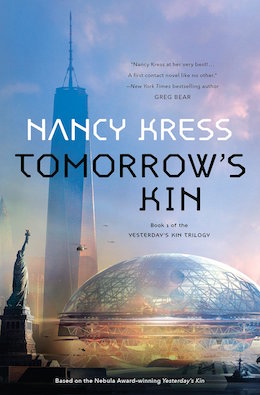Science fiction is rarely great at depicting older women: it seldom does, and when it does, rarely does it seem interested in them as women—with grown children, family issues, rich inner lives, friends and relationships both platonic and sexual—as opposed to ciphers. When I find a book that does depict an older woman well, and moreover puts her in a central role, in the narrative forefront—well, that’s a special occasion.
Nancy Kress’s Tomorrow’s Kin has Dr. Marianne Jenner, human geneticist, for a main character. Dr. Jenner is a mature woman who has just made a minor but important breakthrough in her field when she is summoned to an alien embassy in New York’s harbour. There, she learns that Earth may be facing a catastrophe: space-born spores that could potentially wipe out the whole world.
(Light spoilers ahead.)
Jenner’s response to the likely extinction of her entire species is to focus on her work—she’s helping to find people with a genetic connection to the aliens. But her emotional response is mediated through her reflections on her adult children: her two eldest children have established careers of their own, while her youngest, Noah, is a drifter and a dreamer who finds a connection to the aliens and immediately finds a sense of belonging with them and with their culture. Jenner’s relationship with her children is fraught—as is often the case with adults who have different values and priorities even when they’re not faced with a threat to their very existence that only a handful of people can hope to do anything about—but it is clear that she loves them.
In many respects, Tomorrow’s Kin keeps a tight focus on domestic and personal questions. Jenner’s life after the immediate crisis is past is dominated by her desire to bridge the gap of resentment between Earth’s humans and the aliens, her desire that there should be open communication and commerce between them. But thematically the book is most interested in Jenner’s human relationships with the people around her: her estrangement from her elder son, her complicated relationship with an academic peer who is her sometime lover/partner, her desire for and eventual sexual relationship with her younger, less-educated male bodyguard, her role in locum parentis for her grandchildren—her son’s children, one of whom has a really interesting sensory condition that resulted from the spore crisis—and her friendships, such as they are.
 Tomorrow’s Kin is deeply interested in Jenner as a person, and its quiet, close intensity makes for a refreshingly original piece of science fiction. That’s not to say it’s without flaws: the first section is amazingly well-constructed, but the second half of the book sees a reduction in emotional force and thus, in consequence, feels like a bit of a let-down. It’s also a bit of a let-down from the point of view of being inclusive: both the gay best friend and the black personal assistant (and yes, they’re sufficiently singular as to require the definite article) kick the bucket. So there’s that, too.
Tomorrow’s Kin is deeply interested in Jenner as a person, and its quiet, close intensity makes for a refreshingly original piece of science fiction. That’s not to say it’s without flaws: the first section is amazingly well-constructed, but the second half of the book sees a reduction in emotional force and thus, in consequence, feels like a bit of a let-down. It’s also a bit of a let-down from the point of view of being inclusive: both the gay best friend and the black personal assistant (and yes, they’re sufficiently singular as to require the definite article) kick the bucket. So there’s that, too.
On the other hand, it’s really good to have a science fiction novel that is so interested in an older woman with a family who already knows who she is, and must negotiate the challenges of a mature life. Instead of a novel that takes a coming-of-age narrative, or a chosen hero one, for its model.
Liz Bourke is a cranky queer person who reads books. She holds a Ph.D in Classics from Trinity College, Dublin. Her first book, Sleeping With Monsters, a collection of reviews and criticism, is published by Aqueduct Press this year. Find her at her blog, where she’s been known to talk about even more books thanks to her Patreon supporters. Or find her at her Twitter. She supports the work of the Irish Refugee Council and the Abortion Rights Campaign.










